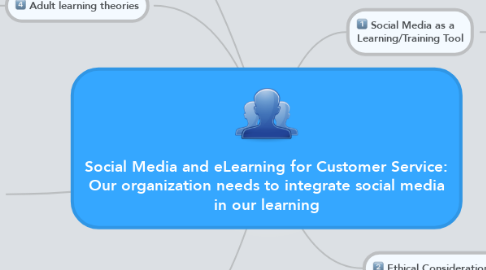Social Media and eLearning for Customer Service: Our organization needs to integrate social media in our learning
by jade poduska

1. Adult learning theories
1.1. Social Cognitive learning Theory
1.1.1. This theory focuses on 3 elements, which include 1. cognitive - knowledge, expectations etc. 2. behavioral - skills, practice, and self-efficacy, 3. Environment - social norms, community
1.2. Andragogy
1.2.1. Assumptions about adult learners. These assumptions include moving from dependent to independent learning; uses life experiences; learns when necessary; problem-centered; internal motivation
2. Student Motivation
2.1. Self Directed study: Adult learners have different needs and goals .They need to understand the reason for the training and how that training will help their careers. By helping them take control of their professional development and encouraging self-directed study it is giving them control. When they have control they are more likely to be motivated in participating.
2.2. Peer motivation: We will be creating an environment of social learning, this will provide peers and co-workers to collaborate and share ideas. They will be able to create learning networks and share information and skills. This will help them to stay engaged because they are not just learning in the class room from trainers but really have the opportunity to share ideas and their skills.
3. Relevant Training competencies
3.1. Successful customer service agents with the company
3.2. Research customer services
3.3. Best Practices
4. References
4.1. Clark, D.R. (2012). Instructional Design: Social Learning and Social Media. Retrieved from http://www.nwlink.com/~donclark/hrd/media/social_learning.html
4.2. TEAL . (2011). Adult Learning Theories. Retrieved from https://teal.ed.gov/sites/default/files/Fact-Sheets/11_%20TEAL_Adult_Learning_Theory.pdf
5. Social Media as a Learning/Training Tool
5.1. Encourages Social learning: Social learning can be an effective tool in learning. It provides the opportunity for learners to share their knowledge, skills, and abilities to enhance the learning experience for everyone. It is guided by the trainer but is not directly instructed and it can be self paced. Which is a benefit for employees
5.2. Addresses Technology integration
5.3. Self directed learning: The organization would like to encourage employees to take more control on their learning and professional development. Integrating social media would help to move to a self directed learning environment
6. Ethical Considerations
6.1. Correct and accurate information and its effects on work productivity: this could be a potential issue. When educational efforts are more self directed there is less control over the content that is being shared.
6.2. Socail Media guidelines: The organization will need to develop and share social media guidelines to ensure that the employes are share appropriate information
6.3. Copy writing or sensitive information: The trainer still needs to be involved and reviewing the learning regardless of where it is located. This is to ensure that participants are sharing appropriate information and not breaking any copy write or other rules.


